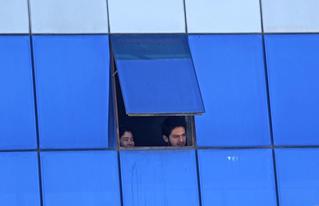Should we stop telling people to fight for democracy?
A few years ago that question would have seemed absurd: The sweep of free elections across Eastern Europe, Africa and Latin America had improved living standards for hundreds of millions, reversed decades of autocratic rot and reduced conflicts and violence. As a thing to campaign for and support with dollars and words, democracy was the safest of bets: Once won, it seemed to open doors.
Doug Saunders How the politics of resentment created a crisis in conservatism
DOUG SAUNDERS Vladimir Putin's fifth column in the West
Doug Saunders That far-right victory in Europe? It's not quite what it seems
At the moment, though, democracy is looking like a lousy investment. Its returns are paltry, and sometimes negative. The established blue-chip stocks in Europe, the Americas, Japan, Australasia, South Korea and India remain fairly strong. But many recent public offerings have crashed spectacularly.
The Arab Spring has disappointed most hopes for an electoral route to betterment in the region with the world's slowest-growing living standards. Tunisians are alone in having improved things. Egyptians can still say they were right to oust their 55-year-old dictatorship, but the military coup against their only fairly elected government (the horrid Muslim Brotherhood) has transformed into an essentially undemocratic and brutally regressive near-autocracy. Libya has gained only democracy but few of its fruits. Syria's democratic hopes have turned to horror.
Myanmar, the subject of decades of international pressure and pro-democracy activism, has seen its brief morning of political freedom tarnished by a government increasingly influenced by repressive acts of Buddhist fundamentalism.
And those are countries our governments and activists have merely attempted to influence and cajole into democracy. Those countries whose democracies have been installed by direct intervention are faring even worse.
Hamid Karzai's Afghan government has been a huge disappointment "“ as Amnesty International recently observed, those few human-rights or living-standards advances made there have been in spite of, not because of, the elected government. Iraq, as we all now know, is faring even worse: Its own installed democracy, led by Prime Minister Nouri al-Maliki, is effectively a Shiite plutocracy that has riven the country with sectarian divides to the point that a ragtag foreign militia has been able to overtake half the country; U.S. President Barack Obama's demand on Thursday that Mr. al-Maliki step down if he wants military assistance showed that elected leadership has become a liability.
Given that recent record "“ and the longer-term record of ex-democratic disappointments such as Russia "“ it might seem that elections are the worst thing you could possibly advocate. Some argue that multiparty democracy delivered to China would splinter the state into ethnic and regional Bantustans, or that bringing the vote to repressive autocracies such as Saudi Arabia or the United Arab Emirates would simply cause them to follow Egypt's or Syria's descent. Aren't they better off without the enormous risk that democracy might bring?
It's tempting, at moments like this, to say that. But there are two flaws in this reasoning. First, it is to abandon people to their fate prematurely, simply because we forget human history: Democracy became the shovel we Westerners used to dig ourselves out of destitution only after we had spent decades using it to batter one another over the head. It took generations before the Robespierres and Cromwells were worked out of the system.
Second, we are applying an emaciated version of the word "democracy."� It is a cliché to say that democracy means more than elections, but the need to build institutions and freedoms, to challenge traditional structures and end the myth that popular sovereignty is a Western import "“ these challenges are too often neglected.
"If the only choices we can imagine are democracy or le déluge,"� the American philosopher Mark Lilla writes in a challenging new essay on democratic dogma, "we exclude the possibility of improving non-democratic regimes without either trying forcibly to transform them (American-style) or hoping vainly (European-style) that human-rights treaties, humanitarian interventions, legal sanctions, NGO projects, and bloggers with iPhones will make a lasting difference."�
To get around this, though, "would mean accepting that, if there is a road from serfdom to democracy, it will, in long stretches, be paved with non-democracy "“ as it was in the West."�
I'm not as willing as Mr. Lilla to believe that we should merely accept this. Nor do I think we should believe the idea, popular once again in some quarters, that some societies and peoples simply aren't meant for liberal democracy. But we do need a lot more humility, and a lot more patience.
Follow Doug Saunders on Twitter: @dougsaunders
Digital all access pass across devices. subscribe
Newspaper delivered to your doorstep. subscribe
The digital replica of our newspaper. subscribe
A collection of articles by the Globe. subscribe
See all Globe Products
Your number one partner for reaching Canada's Influential Achievers. learn more
© Copyright 2014 The Globe and Mail Inc. All Rights Reserved.
Read Full Article »



